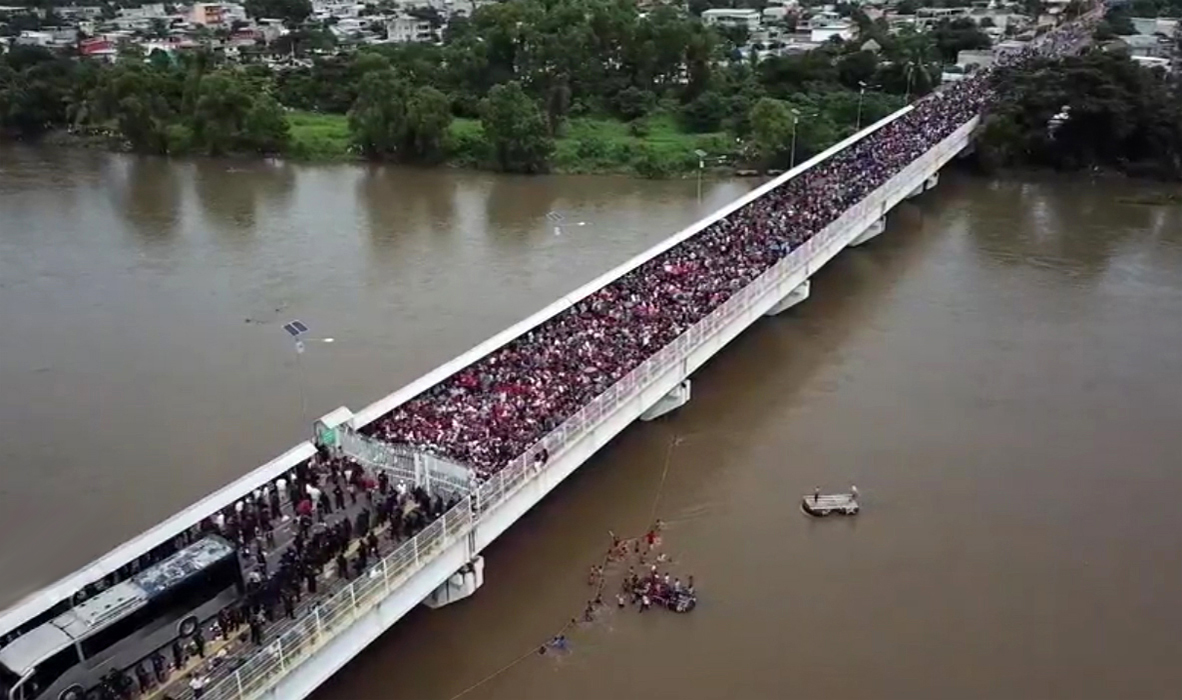Fear of the Migrant Caravan Helps to Bolster Public Approval of Anti-Immigration Policies

Image Courtesy of boitchy on Flickr
A caravan of around 7,000 migrants from Central America is currently continuing on its 1,200-mile journey through Mexico to seek asylum in the United States. While the caravan is still about 600 miles from the United States’ border, President Donald Trump already took to vocal anti-immigration tactics, warning of the “dangerous” and “criminal” nature of the group and calling for full-scale militarized border protection.
The caravan began as a group of 160 people in Honduras and has since grown dramatically. It is now comprised of thousands of migrants coming predominantly from Honduras, Guatemala, and El Salvador. The group is made up of men, women, and children looking to escape dangerous social or political realities in their home countries. Central America has the highest homicide rates in the world. This is heavily due to high levels of gang violence and turf wars that put the individuals living in these places in increased danger. However, Trump maintains that the group is comprised almost exclusively of gang members and other “dangerous, strong, young men.”
In following through on his anti-migrant policies and often violent claims about the “serious threat” that the caravan poses to the national safety of the United States, Trump deployed 2,000 national guardsmen to the border in anticipation of its arrival. Trump also publicly boasted his desire to position more troops as the caravan gets closer to the border in order to protect the United States from the “dangerous migrants”. He proposed sending as many as 10,000-15,000 troops to the border, an undertaking that could cost upwards of 90 million dollars.
In his official public statement, Trump referred to the caravan as an “invasion,” and warned that the migrants “should turn back now.” Trump asserted the dangerous nature of the “many gang members” and “Middle Easterners” that he declared to be a part of the group, despite a substantial lack of evidence to back either claim.
Trump’s public statements took a firm and militarized stance in threatening the caravan with proposed ramifications for continuing en route to the United States. He threatened slashing United States foreign aid to many Central American countries, while criminalizing those attempting to seek asylum.
In criminalizing the migrants, the heightened tensions and fear directed towards the caravan serves to normalize the use of violent force against asylum seekers. Trump stated that rocks thrown by migrants during any altercations at the border would be considered “the same as gunfire,” and would be grounds for the troops to fire at the caravan.
This violent criminalization of migrants and those seeking asylum in the United States is a trend that portrays Central American migrants as criminals, rapists and gang members. These are notions that have become central to the policies and the tactics that are often employed or utilized to attempt to gain public support for certain anti-immigration policies.
In one of Trump’s new campaign ads aimed at increasing support for the Republican party in the midterm elections, he conflates asylum policies to the harboring of criminals. The ad shows the video of Luis Bracamontes, a Mexican man and undocumented immigrant into the United States who was found guilty of the murder of two California deputies, admitting to the murder in court with the words “Democrats let him in” scrawled across the screen. The footage of Bracamontes is intercut with video of migrants rallying and breaking down gates to further represent migrants as a threat to national security.
Fox News has also constructed similar assertions of national security threats, despite statistics that show this to be a blatant misrepresentation. On a segment of “Fox and Friends,” host Brian Kilmeade warned that the influx of immigrants from the caravan posed a threat to the United States as they would be “bringing diseases.”
Trump is utilizing these claims of the ‘dangerous nature of migrants’ to attempt to bolster support for his own policy suggestions. In the wake of his proposals towards birthright citizenship policies, the caravan provides an easy scapegoat to instill fear in voters of the dangers of migrants being granted asylum. In the midst of these heightened tensions regarding the caravan, Trump has also proposed alterations to the United States’ asylum policies, possibly in the hope that a heightened wariness towards migrants will gain him public approval.
Despite a plethora of public statements claiming that the caravan carries diseases, harbors criminals or otherwise poses a security threat to the United States, the Central American asylum seekers continue to trek peacefully through Mexico.




